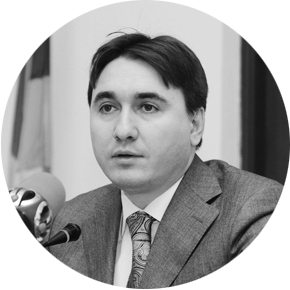The interview of Armenian Vice Prime Minister, Minister of Territorial Administration Armen Gevorgyan to Mediamax
- How would you assess projects implemented in Armenian regions by private companies within their corporate social responsibility (CSR)?
- CSR is a new policy for Armenia. The core and essence of this policy are yet not widely spread and fully perceived and I believe it requires more time, although positive experience has already been registered in Armenian regions and it can be employed by other private companies as well. On the whole, it can be concluded that the popularity and the perception of this policy is yet far from satisfactory.
- Can we say that the government has an established policy to somehow encourage those private company projects?
- We can't yet talk about a clearly shaped paper policy but it has already become traditional for the government to encourage CSR actions. The state encourages such projects through its participation and involvement and sometimes, it acts as a co-author or a co-sponsor. They might be referred to as social responsibility acts carried out within the ideology of public-private cooperation.
We are presently working on the new target toolset for the resolution of issues related to territorial development: the works aimed at the restructuring of Armenia’s Social Investment Fund’s new Territorial Development Fund are underway. One of the new fund’s areas of activity will include offering private sector partners projects aimed not only at the improvement of certain community infrastructures but also at the creation of new business opportunities, which in their turn, will serve an effective ground for future implementation of CSR policy in those communities.
- Tatev Revival project as well as Geoteam’s projects in Amulsar’s adjacent communities and Jermuk are good examples registered in Syunik and Vayots Dzor regions. How does the state assess these projects?
- Syunik and Vayots Dzor examples can be apparently accredited as a successful experience in this sphere in which we have already established traditions. The projects you mentioned are the best over the past period and it should be also noted that Kajaran Copper-Molybdenum Factory has been quite actively operating within the CSR policy in Syunik region for already many years and it makes significant investments in the development of the communities. The owners of Kapan and Agarak factories are also involved in the implementation of such projects.
- Over the past years, VivaCell-MTS has carried out various projects in the regions; in its turn, Orange Armenia implements projects aimed in remote villages. Does it mean that due to their projects these companies considerably ease the challenges the state faces?
- Not only the two mentioned companies but other companies as well, among them, for example, Grand Holding (which carries out interesting projects in Tavush region), do their best to address the urgent community issues, which can nowise be resolved within the state projects. In this sense, all such companies actively employing CSR policy do facilitate the challenges the state and the communities face.
In this context, I would like to point out that the idea of CSR implies not only implementation of certain infrastructural or capital investment projects, but also investments in the human resources. For example, the latest such example was the involvement of Eduardo Eurnekian’s garden experts in Armavir region into “Shenik” WUA Administrative Board. A company’s wish to contribute to a particular infrastructure through its professional potential and experience is also an example of social responsibility. Of course, it's also encouraging.

Armen Gevorgyan in Syunik Investment Conference.
Ministry of Territorial Administration.
- Recently, the government has decided to take joint anti-landslide measures with UWC Dilijan International School. Does it also come out of the private-public cooperation logic?
- The decision was made within the framework of the logic, which implies that the state cannot stay on the sidelines from the implementation of a project, which not only require great investments but is also unique in the region and might have a huge impact in that particular area.
I believe the decision the government passed on Aghstev Riverbank protection was the least we could do for this project, which can offer new quality and meaning to the city.
- Sometimes certain groups, particularly, ecologists criticize the projects implemented by the companies claiming that what they want in reality is to “bribe” the local people and cause their attention to deviate from the possible negative outcome of the projects. Is there such a risk or is everything just too exaggerated?
- There might be different assessments indeed. But the simple truth is that if all the projects are implemented within law and they do not violate state or international standards, then it’s the “non-implementation” of those projects that should cause confusion.
We are thankful to NGOs as owing to their discussions and activities certain issues and drawbacks are raised from time to time, which receive a solution by private organizations right on the spot.

Armen Gevorgyan in Armavir marz.
Ministry of Territorial Administration.
Not only the positive economic indices speak of an organization’s successful activities but also its social achievements that it can be proud of. When a community lacks minimum social conditions and infrastructures such as a kindergarten, sports and cultural centers, health institutions, well-maintained roads, regular water supply, a company cannot function properly and ensure high levels of employee productivity. In this context, I believe the employment of the CSR component will guarantee the success of many private organizations.
- Are there any regions where no projects are carried out within the corporate social responsibility?
- Yes, there are regions where the situation is far from satisfactory. It is partially due to the industrial peculiarities of that particular region, even though, the IT companies, for example, implement projects in virtually all regions.Those traditions are comparatively flimsier in agricultural regions. Thus, we hope to have such projects in the future, which will be possible to carry out within state-community-private cooperation. GeoProMining company’s activities in Gegharkunik and Ararat regions are one example of the mentioned cooperation. In their turn, coordinated and targeted works with various social, charity and international organizations also greatly contribute to the formation of such a new tradition. Pivotal changes in the development of a particular community can be reached by combining the efforts of the mentioned infrastructures, government, communities and private organizations. In a number of regions reported to have a low activity level of private companies, the same projects are carried out by social and international organizations in cooperation with the local communities. I believe maximum results will be achieved after all efforts are combined.
- Much is spoken about the state of border villages. Do you think pilot projects based on public-private cooperation should be worked out for several such villages?
- The issues border villages face are always in the focus of interest of the government. Apparently, we cannot say that all issues are resolved in those communities but it will be unfair if we don’t admit that the government consistently pays much attention to the solution of those issues. The government’s approach is expressed in various ways - from targeted projects, among them the reparation and construction of schools, community centers and potable water pipes, to various support projects, including supply of diesel fuel and fertilizers at affordable prices and privileges for land tax and irrigation water payments. Yes, private company activities are yet not at a satisfactory level in these communities and through investments in the development of the infrastructures, the government attempts to encourage and create conditions for private investments as well. We welcome all proposals made by various companies aimed at the resolution of border community issues. Our main goal is to reach a level at which those communities will be safe for living, proper welfare conditions will be ensured and the young generation will not look for its well-being outside those communities.
Ara Tadevosyan talked to Armen Gevorgyan.




















Comments
Dear visitors, You can place your opinion on the material using your Facebook account. Please, be polite and follow our simple rules: you are not allowed to make off - topic comments, place advertisements, use abusive and filthy language. The editorial staff reserves the right to moderate and delete comments in case of breach of the rules.